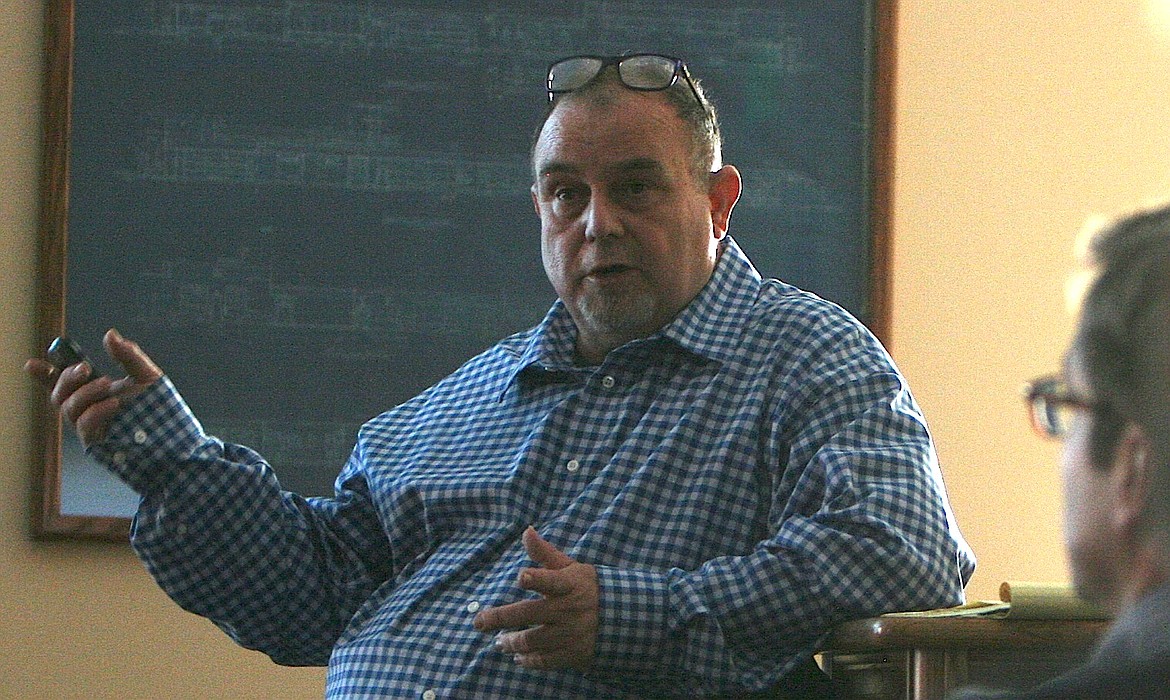Merger mania
By BRIAN WALKER
Staff Writer
COEUR d'ALENE — Avista Utilities' proposed merger with Toronto-based Hydro One Limited is producing energy in opposition.
Roughly 25 people attended a workshop hosted by the Idaho Public Utilities Commission staff at the Midtown Meeting Center on Wednesday night to provide an update on the proposal, receive written testimony and answer questions.
Matt Evans, IPUC spokesman, said the commission has received more than 80 comments in opposition to the merger proposal in advance of the public hearings that are to be scheduled for late May.
Coeur d'Alene's Steve Adams is among those who oppose the transaction.
"A foreign-owned corporation should not own or control our dams, electrical or natural gas infrastructure," he wrote to the IPUC. "It is a matter of national security."
Coeur d'Alene's Thomas Price said he also has concerns as an Avista stockholder.
"I do not want my stock transferred to Hydro One in Canada," he said. "Local management in Spokane has been a good choice for me."
Hayden Lake's Jim Hollingsworth said he has concerns that rates would rise due to Canada's green energy policies; Canada's government would become the chief stockholder; and that the company could eventually be sold to China or other countries.
"That would represent very bad policy," he said.
Medimont's Jim Eder added: "Hydro One charges exorbitant rates and they're going to windmills."
Bentley Erdwurm, utilities analyst for the IPUC, tried to calm the concerns about Hydro One imposing high Canadian rates here.
"Let me set your minds at ease — that can't happen," he said. "There will be no cross-subsidization between jurisdictions. Idaho rates will be approved by the Idaho Public Utilities Commission. The commissions will still look after people in their own state."
Evans said rates will not go up if the merger is approved and, in fact, there would be a 1 percent decrease to Idaho customers over each of the next five years.
"It would be 1 percent lower than it would have been absent the settlement," Evans said. "The decrease will occur because the companies agreed to it. The companies indicate the economies of scale brought on by the merger would allow savings that will be passed on to customers."
Casey Fielder, Avista's communications manager who attended the workshop, said Avista believes the proposed merger will be beneficial for its customers and stakeholders.
"After the transaction closes, Avista will continue to operate as a stand-alone company under the same name, from the same headquarters in Spokane, with the same employees, same management team, overseen by a board of directors with significant Pacific Northwest representation and with the same levels of high quality service for customers," Fielder said.
"Avista will continue to run the business and serve customers and communities as it always has with local decision-making authority."
It will also continue to manage all operations of the utility and comply with federal regulation under the Federal Energy Regulatory Commission (FERC) and the North American Electric Reliability Corporation, she said.
Fielder said customers will continue to see the same level of regulatory oversight by the utility commissions in each state.
"This means that the commissions will continue to set the rates Avista customers pay for their energy," she said.
Avista provides electrical service to about 378,000 customers in the Northwest and 342,000 natural gas customers. In North Idaho, it serves 130,000 with electricity and 82,000 with natural gas. Hydro One provides electric service to more than 1.3 million customers.
The transaction would create one of the largest regulated utilities in North America with more than $25.4 billion in assets.
Receiving service from a larger utility would allow Avista customers to "receive the benefits of scale … while also avoiding the risk of a potential subsequent acquisition by another party that may not share Avista's culture and values," the company’s application states. The company's purchasing power would increase, while legal, accounting, technology and research costs would decrease, the application states.
The IPUC regulates Idaho's investor-owned utilities, ensuring adequate service and reasonable rates. The commission's three-member board is among the regulatory entities that must approve the merger. IPUC staff is one of the parties in the case that will present evidence to the commissioners.
For the sale to be approved, the IPUC board, under state code, must find that the transaction is consistent with public interest, rates shall not increase because of the transaction and that the buyer has the intent and ability to operate the property. Avista and Hydro have the burden of proof that those standards are met.
FERC granted its approval in January, but the merger must also be authorized by the Committee on Foreign Investment in the United States, an inter-agency governmental board that reviews national security implications of foreign investments in U.S. companies.
Avista and Hydro One last July announced the Canadian firm would buy Avista for $5.3 billion. In September, the companies filed an application requesting the IPUC approve the merger agreement. Last week the parties agreed to terms of the transaction in documents filed in Idaho in Washington and requested that the IPUC make a decision by Aug. 14.
The proposal calls for Avista to become a wholly-owned subsidiary of Hydro One, the largest electric utility in the province of Ontario.
Fielder said private shareholders hold more than half of Hydro One's shares. The company's largest shareholder, at just over 47 percent, is the Province of Ontario, but it is not a controlling shareholder, she said.
According to an agreement between the province and Hydro One, the province does not hold or exercise any managerial oversight over Hydro One.
"While the province will remain Hydro One's largest shareholder, its nominees to the board of directors must be independent of the government," Fielder said.
Three public hearings — likely to be held in Coeur d'Alene, Sandpoint and Lewiston — on the proposed merger will be set for late May on dates to be determined. A technical hearing will be held on June 27, which is also when the comment period ends.
The workshop came on the heels of a meeting last week at the Coeur d'Alene Public Library in opposition to the merger and organized by the North West Property Owners Alliance.
Evans said a lot of work needs to be done to determine if the merger passes muster.
"I wouldn't say it's a done deal at all," he said.
"The commissioners want to hear from the customers … and would need to vet any agreement reached by the parties involved."



